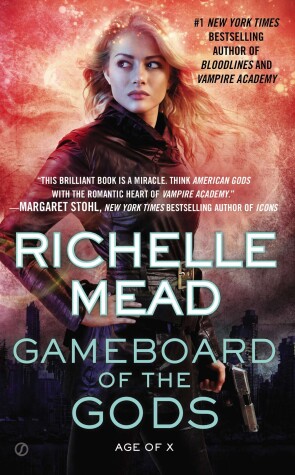Reviewed by Angie on
Gameboard of the Gods begins with a fist-fight at a funeral. Richelle Mead certainly knows how to make a first impression! Unfortunately, everything just goes down hill from there. I was confused and bored for the majority of the time reading this, which is something I never thought I’d say about a Mead book.
Gameboard of the Gods takes place in a futuristic world after the Decline, where religion is banned and races live separately. The technology is super advanced, and RUNA appears to be some type of utopia, but I never really understood how the world worked. The story follows Justin and Mae as they try to solve a murder mystery involving cults, and to a lesser extent, Tessa who has immigrated from Panama on a student visa. Neither plot held my attention.
There is an incredible amount of world-building in
Gameboard of the Gods. In fact, I would say it was the focus of the book along with character development. Despite that, I was still confused about this world. The world was struck by the Mephistopheles virus, which left people infertile, with asthma, and damaged hair and scarring. The solution found to protect people from this virus was genetic mixing, which of course doesn’t go over too well with everyone. Plebians are the people who are a result of genetic mixing, while Patricians/Castals are genetically “pure.” I didn’t understand why so many patricians even still existed in RUNA if there was such rigorous forced mixing, in addition to people emigrating to avoid it and the punishments doled out for refusing. Even more confusing is why the patricians are considered genetically superior if they’re susceptible to this virus and aren’t even suppose to be in the majority. They even have their own land grants that keep them separate from the rest of the population. It makes no sense.
Religion was banned because it apparently makes people do crazy things, and believing in fictitious entities is stupid. At least, those are the reasons given. I actually think religion was banned in order to the make the whole being chosen by a god plot more exciting and dangerous. If you’re not even suppose to believe in gods, of course you can’t admit that one is essentially stalking you and trying to recruit you! This is the case for both Justin and Mae. He’s aware of it, she is not. However, there were still some “licensed” churches/temples around, if they were deemed safe. I didn’t understand how that process worked either. Basically all the world-building was a failure. After almost 500 pages, I still have no clue what is going on. And it didn’t help that we’re bombarded with terms and names at the very beginning but don’t get any explanations or definitions until several chapters in.
The characters aren’t much better. Justin is a womanizing, drug addicted, alcoholic genius. Mae is a cold and standoffish soldier. Tessa is innocent and boring. Tessa actually served no purpose other than as a world-building tool. There’s some culture shock when she leaves her “backward” life in Panama for the glitz and glamor of RUNA, and allowed for comparisons between the two regions. Other than that, she’s just kind of there, adding needless pages. As for Justin and Mae, I didn’t like either of them. They’re both unlikeable from their very first chapters, and it isn’t until the second half and last third of the book that we get any explanation of why they are the way they are. I think this is something that should be established earlier, so the readers can connect (or not) with them.
There are a couple of plots happening within
Gameboard of the Gods, but they’re all in the background for most of the book while the characters mope around, getting drunk. The main one being the murder mystery. Justin is on a strict time limit, but he doesn’t really spend much time working on the case. Everything kind of falls into his lap when the time is right. I’ve already mentioned Tessa trying to assimilate into RUNA, which was useless. There’s also Mae trying to find her niece, but the importance of this and the reason doesn’t appear until close to the end, and it’s never resolved. It’s like that plot thread just got dropped. There really isn’t much to say about the plots, since they came and went and weren’t interesting at all.
It’s clear that the author put a lot of thought into creating
Gameboard of the Gods. I don’t doubt that she knows this world and the characters inside and out, but I felt like she forgot that it was our first time meeting them. There’s lots of detail and history, but it seemed jumbled and disorganized. While I didn’t enjoy this introduction to the series, there are some intriguing ideas being tossed around. I’ll give the second book a read before I decide to abandon this series or not.
Read more of my reviews at Pinkindle Reads & Reviews.
Reading updates
- Started reading
- 25 May, 2013: Finished reading
- 25 May, 2013: Reviewed
